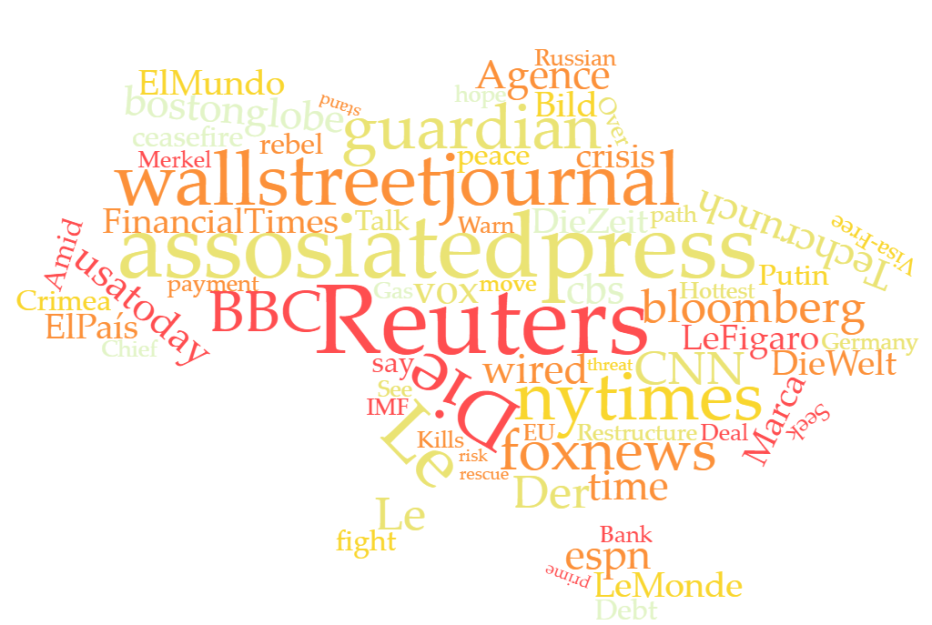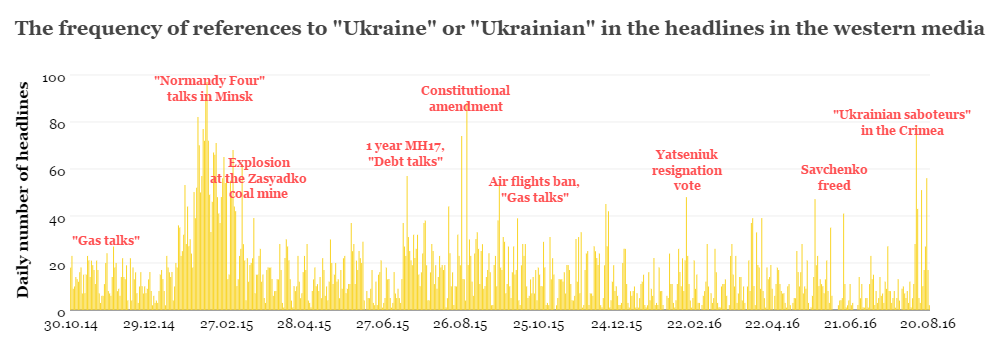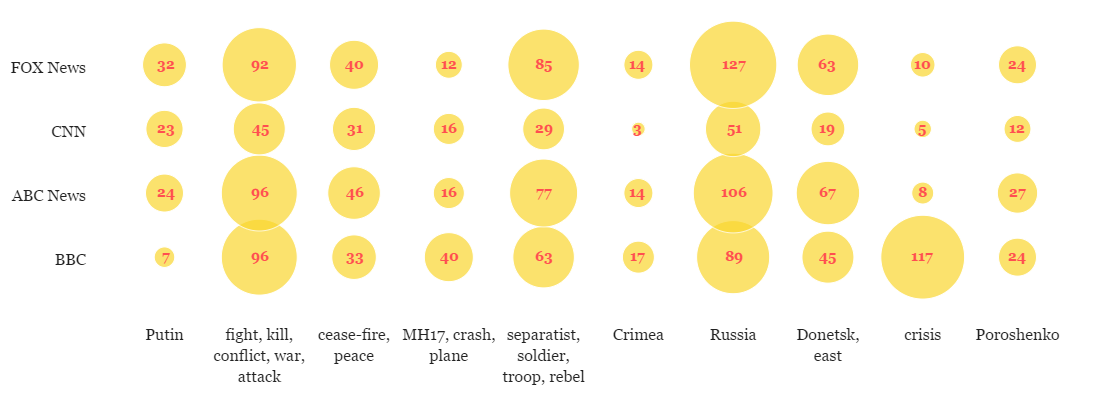

"Do not believe headlines", warns Halyna Tymchenko, the ex-chief editor at "Meduza". Indeed, a journalist or editor can significantly exaggerate or twist the content of an article by manipulating its headline. However, when it comes to thousands of headlines in the most reputable western media, these data might reflect some trends in a given topic. Our aim is to find out what the most reputable and influential western media have written about Ukraine.
We are very grateful to the "Оkо" project for this data. "Oko" uses automated tools to collect, sort and analyse the articles in hundreds of media that contain references to Ukraine. This data is of great value to scientists, journalists and all those who are concerned with the information security of Ukraine. By analysing the data we can determine the context in which media refer to Ukraine, how the frequency and tone of references change, and which sources and news transmission channels are the most influential and efficient. No doubt, this is an invaluable tool, given that Ukraine has been involved in a fluid and dangerous information war.
The "Oko" collection includes about one million articles in eight languages that have been published in the last 2.5 years. To keep the scope of this study within reason, we have limited the data sample by the following criteria:
The data can be downloaded from data.voxukraine.org
| MEDIA | WEB PAGE | COUNTRY | NUMBER OF HEADLINES |
|---|---|---|---|
| Reuters | reuters.com | UK | 4875 |
| Bloomberg | bloomberg.com | USA | 1030 |
| Wall Street Journal | wsj.com | USA | 638 |
| New York Times | nytimes.com | USA | 558 |
| ABC News | abcnews.go.com | USA | 501 |
| Guardian | theguardian.com | UK | 492 |
| Washington Post | washingtonpost.com | USA | 450 |
| Fox News | foxnews.com | USA | 434 |
| British Broadcasting Corporation | bbc.com | UK | 423 |
| Financial Times | ft.com | UK | 415 |
| Associated Press | ap.org | USA | 278 |
| Cable News Network | cnn.com | USA | 255 |
| USA Today | usatoday.com | USA | 199 |
| Time | time.com | USA | 79 |
The gas negotiations between Ukraine and Russia in fall 2014 ("gas talks") caused the first surge in interest ("Ukraine-Russia Gas Talks Deadlocked in Brussels" - abcnews.go.com, "Ukraine and Russia Reach Deal on Natural Gas Supplies" - nytimes.com). Gas debates between the two neighbours interest the western media because their result influences the stability of Russian gas supply to Europe and macroeconomic indicators of Ukraine such as the amount of debt and the ability of Ukraine to service it ("Ukraine sees Russia gas price at $365-378, ready to pay off debts" - reuters.com).
In addition to gas talks, Western media paid a lot of attention to the "Normandy Four" talks in Minsk (February 2015), the death of 32 people at the Zasyadko coal mine (March 2015), the constitutional amendment in the area of decentralisation (end August-beginning of September 2015), and "Ukrainian saboteurs" in the Crimea (first half of August 2016). In this period, the number of publications exceeded the average amount (16) three- or fourfold.

The interest in important geopolitical events or catastrophes by the media is predictable. Our analysis helps look at "Ukraine in the media" in more detail. What is the context in which the largest printed outlets, online media and TV channels mention Ukraine?
Headlines in western media usually mention "Ukraine" or "Ukrainian" together with such words as "fight", "kill", "conflict", "war", "attack", "Russia" and less so with "cease-fire" and "peace". The words "separatist", "soldier", "troop", "rebel", "Donetsk", "east" are used somewhat less often. The word "Crimea" is mentioned very rarely. The BBC prefers to use "crisis" in its headlines. The reason is that bbc.com publishes all the news related to the conflict in the east of Ukraine (as well as to the Crimea problem) under the heading "Ukraine crisis". For instance, "Ukraine crisis: Crimea in the dark in Russia power row" or "Ukraine crisis: "Russian soldier's" lawyer found dead".


It is worth looking more closely at Reuters, which is the largest source for news from Ukraine (based upon the number of headlines). 46% of headlines in our sample come from reuters.com and its subdomains (uk.reuters.com, in.reuters.com etc). Similar to western newspapers and broadcast services, Reuters actively uses the words that describe the conflict in the east of the country. More attention is also paid to the debt issues, as 7% of headlines mention the word "debt" (Reuters is a business news agency). It is more probable to see the word "Putin", than, e.g. "Poroshenko" or "Ukraine president".

The intermediate conclusion is that western media combine the words "Ukraine" or "Ukrainian" with the words that describe the conflict in the East of the country ("war", "conflict", "attack", etc.) more often than with reforms and the fight against the corruption.
Business media (Bloomberg, Financial Times, Wall Street Journal) tend to focus more on how Ukraine services its debt. 12% of all headlines mentioned the restructuring of debt and the IMF agreement. In 2014 and in the first half of 2015, negative headlines prevailed: "IMF warns Ukraine bailout at risk of collapse», «Ukraine bonds sink as debts spiral" (both ft.com) or "Ukraine Said to Risk Losing IMF Support for Aid If War Escalates" (bloomberg.com). In the second half of 2015 and in 2016 the situation improved, and the number of positive headlines rose: "Ukraine Deserves Debt Relief" (wsj.com) or "Ukraine Rating Raised to B- by S&P on Debt Exchange, Reform Plan" (bloomberg.com).
"Debt talks" and "IMF deal" are mentioned much more often than "corruption" and "reform". It may be the case that corruption and reforms are internal problems of Ukraine and do not interest Western media that much. On the other hand, it is possible that Ukraine (both the state and its civil society) do not try hard enough to spread the information about the success and progress of reforms. Only 1% of headlines contain the word "reform". Moreover, most of this 1% reflects the preoccupation of Western media with the advance of reforms. For instance, "Ukraine political crisis deepens as another reformer resigns" (ft.com) or "IMF Warns Proposed Legislation in Ukraine Threatens Reforms" (wsj.com).

Nowadays, researchers, journalists, communication experts and others have a wide variety of options to conduct data analysis. For instance, IMB Watson offers a linguistic analysis service that classifies text data depending on tonality. This service is based on machine learning algorithms and psycholinguistic research.
The analysis of articles (news, articles, columns) about Ukraine helps to understand how foreign media perceive our country and correspondingly, what kind of image the country is developing. This is not only a matter of prestige and attraction to potential tourists and investors. A positive image is also a critical component of Ukraine’s ability to defend itself in the ongoing information war waged by the Russian government.